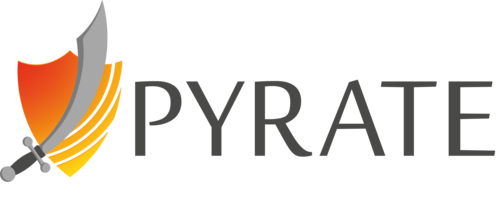Pyrate Polymorphic agents as cross-sectional software technology for the analysis of the operational safety of cyber-physical systems
Motivation
Critical infrastructures such as energy supply, medical systems or traffic control, which are described in modern cyber-physical systems (CPS), are inevitably becoming increasingly complex. Traditional methods to ensure the operational safety of these complex systems through calculations, modelling and analytical procedures in advance have to fail due to the increasing complexity of the systems themselves and the multitude of unpredictable inputs from outside.
Goal
PYRATE develops an intelligent, learning system for the analysis of CPS. A system of software agents is used, which adapts itself fully automatically to the CPS only by a description of the existing sensors and actuators, which is represented in the investigation by a so-called digital twin. The PYRATE software technology independently develops a model of the system; the name of the multiform polymorphic agents derives from this ability to adapt using the interfaces. These agents coordinate to find a weak point, where the subdomains of the whole system work within nominal parameters, but the whole system is destabilized by emergent effects in the interaction of the domains.
In particular, so-called attackers, i.e. market players who use "loopholes" in regulations, are the aim of the analysis strategy. PYRATE enables experts to close these loopholes, which would not have been noticeable in the traditional view of a CPS. The attackers are also confronted with AI defenders who are supposed to keep the system reliable. They learn their strategy for maintaining operational security directly from the attackers.
Internal Leader
Scientific Director
Veith, Eric MSP and Balduin, Stephan and Wenninghoff, Nils and Tröschel, Martin and Fischer, Lars and Nieße, Astrid and Wolgast, Thomas and Sethmann, Richard and Fraune, Bastian and Woltjen, Torben; CYBER 2020, The Fifth International Conference on Cyber-Technologies and Cyber-Systems; October / 2020
Wolgast, Thomas and Veith, Eric M. S. P. and Nieße, Astrid; Proceedings of the Twelfth ACM International Conference on Future Energy Systems; 2021
Wolgast, Thomas and Veith, Eric M. S. P. and Nieße, Astrid; Energy Informatics; 2021
Wolgast, Thomas and Ferenz, Stephan and Nieße, Astrid; IEEE Access; 001 / 2022
Stephan Balduin. and Eric Veith. and Sebastian Lehnhoff.; Proceedings of the 12th International Conference on Simulation and Modeling Methodologies, Technologies and Applications - SIMULTECH,; 2022
Bozionek, Jan and Wolgast, Thomas and Nieße, Astrid; Energy Informatics; 2022
Balduin, Stephan and Veith, Eric M. S. P. and Lehnhoff, Sebastian; Simulation and Modeling Methodologies, Technologies and Applications; 2023
Wolgast, Thomas and Wenninghoff, Nils and Balduin, Stephan and Veith, Eric and Fraune, Bastian and Woltjen, Torben and Nieße, Astrid; SoftwareX; 004 / 2023
www.hs-bremen.de
www.uni-hannover.de




